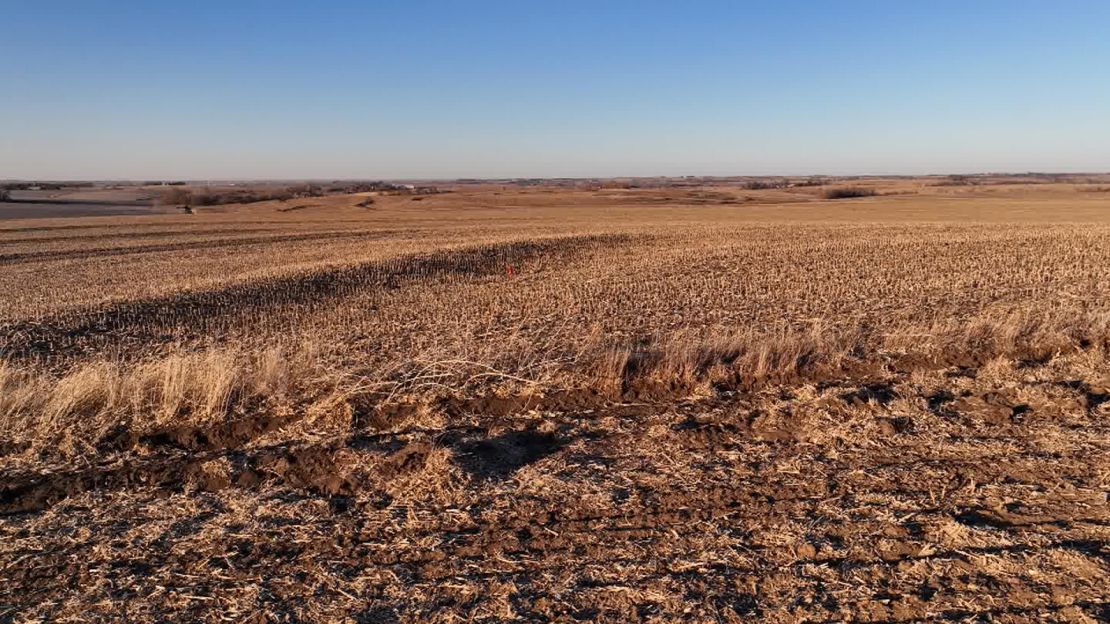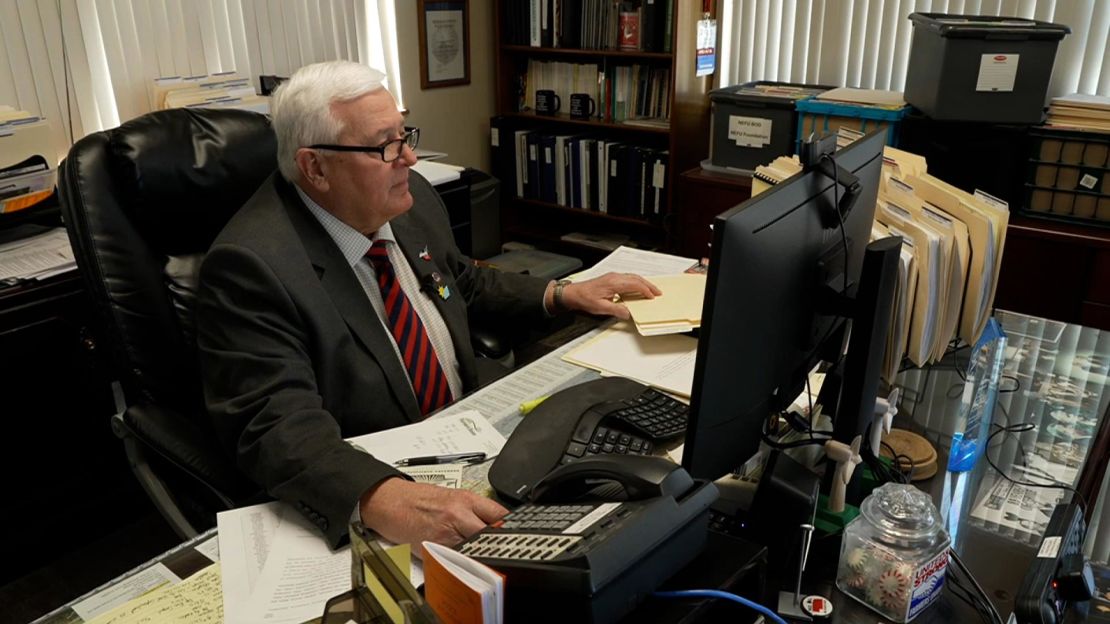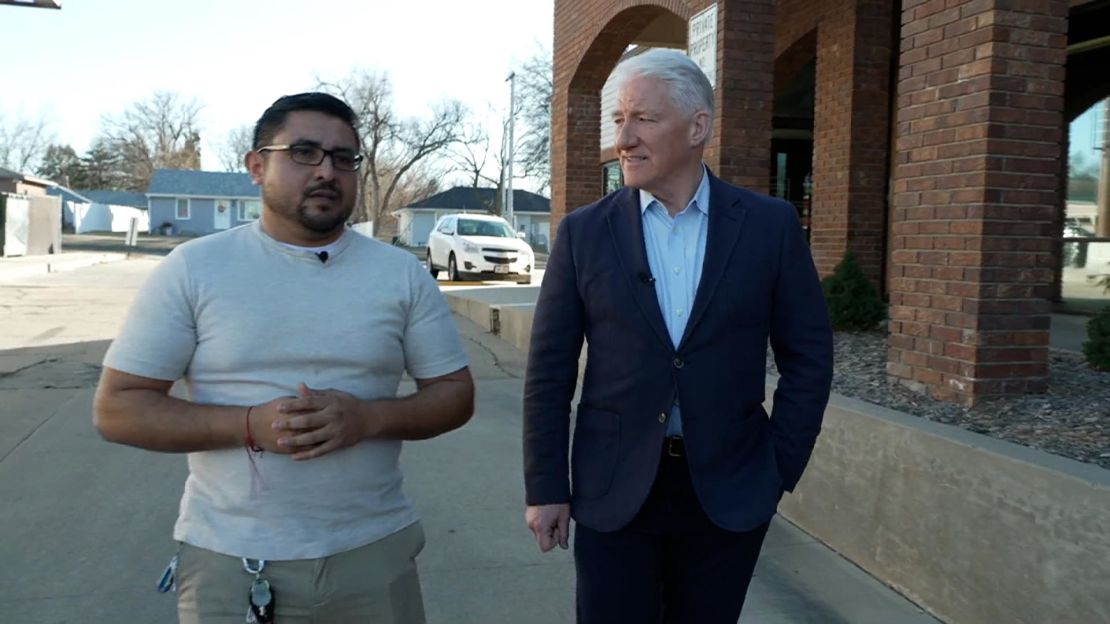Lincoln, Nebraska
CNN
—
Sleep is hard to come by because of constant fear and uncertainty. But, she says, it is better than the alternative: “If I go back to Honduras, they will kill me.”
Week three of the new Trump term is week three of G’s insomnia. Her lawyers tell her she should be OK – that the asylum process she started a year ago should protect her. But G follows the news closely, hears rumors of ICE sightings constantly and recoils at President Donald Trump’s rhetoric about people like her.
“Claro, si por supuesto,” she answers when asked if she is worried about being deported by Trump despite having a pending asylum case.
“Of course, for sure,” is the English translation. “Because he tries to implement quite strict policies with immigrants in general, and I think even more with people who have just entered the country. At least with the program I entered with, there is some instability, so to speak. So, of course, that increases anxiety and concern.”
G entered the United States a year ago, using a Customs and Border Patrol phone app – CBP One – designed to streamline and more effectively manage asylum claims. Trump eliminated the app on his first day in office, and his immigration advisers often criticize Biden policies and talk of identifying and deporting migrants who most recently entered the United States.
G was a journalist in Honduras, and her reports about political corruption and government collusion with violent gangs made her, she says, a target of regime harassment and violence.
“I cannot return under any circumstances because I would be risking my life and my family’s life,” she said. “With Trump in power, everything I have achieved so far is at risk. He will probably review my case and force me to return – something I cannot allow. That is my biggest concern.”
G shared her story – and her fears – only after we agreed to protect her identity. She lives in Nebraska now, a red state that backed Trump by more than 20 points, where we found an immigrant community filled with outrage and fear. Those immigrants and their advocates are convinced the Trump enforcement crackdown is coming to their community sooner or later.
“The fear is real among us,” said G.
Our Nebraska visit is part of our evolving “All Over the Map” project, started in August 2023 to track the 2024 presidential election through the eyes and experiences of voters who live in key areas or are part of critical voting blocs. Now, with Trump back in the White House, we will keep in touch with those voters as well as adding to the group – and our target states – to track key policy initiatives of the new administration.

An agricultural state that needs labor
Nebraska Republican Gov. Jim Pillen praises the Trump crackdown and has offered state resources to help federal authorities. The governor declined an interview request during our Nebraska visit, but provided CNN a statement that said, in part: “Criminal aliens, weapons, deadly drugs and human trafficking have infiltrated Nebraska communities. I stand with President Trump and have issued my own executive order to ensure Nebraska state agencies do the same.”
Police chiefs in the two largest cities, Omaha and Lincoln, have called immigration enforcement a federal issue and said their resources would not be used to assist any federal crackdown. Likewise, public school officials in those cities have said their priority is making students feel welcome, regardless of their status.
Mary Choate, an immigration attorney in Lincoln, said the fear and uncertainty have parents worried about sending their children to school, or about attending services offered to them like English lessons.
“We really want to keep immigrants and refugees involved in the community because they’re so integral to our community,” said Choate, executive director of the Center for Legal Immigration Assistance. “But it’s been very difficult for them to be able to do that because they fear going outside of their homes.”
There is no consensus figure on how many undocumented immigrants live in Nebraska. Estimates range from 30,000 to 75,000. Still tiny compared to, say, California, Texas, New York or Illinois.
But Nebraska’s total population is just over 2 million and many of its leading industries are desperate for workers. Nebraska is second only to Texas in US beef production, sixth in pork, and its Cornhusker State nickname speaks to its status as an agricultural giant.
“Trying to find good, motivated, reliable help is a challenge,” said John Hansen, president of the Nebraska Farmers Union. “So, depending on how the president goes about this, it could be a potentially very, very negative impact.”
Even more so, perhaps, as Trump threatens to impose new tariffs on imports from Canada and Mexico, which have been delayed for a month. Hansen said any disruption in the US food supply chain caused by an immigration crackdown could be painful for business and consumers.
“If we have a hitch in the get-along in Nebraska, it’s a big enough processing state that’s going to, it’s going to be felt in the food chain,” Hansen said. “And we’re not unique from other states.”
Hansen, a Democrat, has been president of the farmers union since 1989. He is well aware immigration policy has long been political quicksand.
“Do we need better enforcement? I think we do,” Hansen said. “But we, you know, there’s, there’s a constructive way to do it, and there’s a less constructive way to do it.”

By that, Hansen means he believes true reform would include both improved border security and a path to status for undocumented immigrants who have not committed any crimes since crossing illegally into the United States.
There were proposals to that effect during the George W. Bush administration, and again during the Barack Obama administration.
Back then, the ideas under consideration included allowing the undocumented to remain in the states and get on a path to status and even citizenship. Several ways to include accountability were discussed, like paying additional taxes or some other penalty, or perhaps being placed in a longer line for citizenship.
But immigration is one of the issues on which Trump’s remake of the GOP is most dramatic. Demanding the undocumented return home is now the overwhelming sentiment in the Republican Party and there is little GOP talk at the moment about broader new immigration legislation.
“Trump is primarily a disrupter,” Hansen said. “He’s not a fixer. … Hyper partisanship is not helpful, not constructive. It doesn’t solve problems.”
Red-state voters looking for Trump-style disruption
The Trump effect is hardly confined to Washington.
“if you’re here illegally, please leave,” is the view of Republican state Sen. Kathleen Kauth. “Go back, go through the process legally.”
Kauth is sponsoring legislation to require Nebraska employers to verify their workers have legal status. She sees the proposal as common sense. But she acknowledges the emotions of the national immigration debate might complicate efforts to attract local Democratic support.
“I think anytime you have polarization, you know, people tend to go to their sides and stick to it,” Kauth said in an interview at the Nebraska State Capitol. “I’m really more worried about Nebraska and focusing on, what do we need in Nebraska to understand the problem? How do we make sure that we are keeping people who are not here legally from taking jobs from people who are.”

Kauth acknowledges Nebraska needs more workers. But she believes the state could handle any disruption caused by stricter immigration enforcement. On the day of our visit, Kauth was also meeting with the leader of a program that helps people recently released from prison find work.
“I’m very big into second-chance employment,” Kauth said.
In any case, her view is that following the law is paramount.
“I kind of view it as a poison fruit, from poison apple, from the poison tree, whatever the legal definition is,” Kauth said. “If your first act is to break the law, you have become a criminal. And so therefore, everything after – even if it’s well intentioned, even if it’s wonderful – please go back and go through the process, because we do want you here, but we need you to do it the right way. And I don’t think that that should ever change.”
‘A scary time’
That sentiment – in Washington and in Lincoln – has the immigrant community on edge.
“It’s a scary time for my community,” said a man we agreed to identify only by his nickname, Gin.
He was brought into the United States illegally as a child but has a green card now and is working toward citizenship. “This is what the American Dream is all about, not fear,” Gin said.

But Gin said he has family and friends who are undocumented and was worried that speaking to a reporter might make them Immigration and Customs Enforcement (ICE) targets.
“Where it going to end?” Gin asked, describing how just a rumor about ICE activity can set off a flurry of nervous phone calls and texts. “It starts off like, have you seen immigration, have you seen this? And you see the fear in people’s eyes, just the fact that they can’t go out to the store, they can’t go pick groceries, or even hospitals.”
Gin wishes Trump would pair tougher border security with some form of amnesty modeled after the approach President Ronald Reagan took four decades ago.
But he knows that is beyond wishful thinking.
“His first term was more of, like, let’s see if this can happen,” Gin said. “This year is more – I’m going to do it. … definitely more aggressive.”


